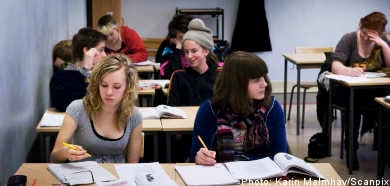The proposed grade scale would consist of six levels corresponding to the letters A through F.
“For the sake of pupils I want it to be easier to attain a higher grade. Today many pupils wonder why the Pass grade is given for very different results. The new system will be fairer,” said Education Minister Jan Björklund in a statement.
Currently, Swedish students can receive one of four grades, with three corresponding to passing marks and the fourth representing a failing grade.
In the new system, A through E will correspond to a passing grade of varying degrees. Students whose work is deemed unworthy of a passing grade will receive an F.
A corresponding numerical value ranging from 10 to 20 will be assigned to each letter grade, with the exception of F, which will be assigned a value of 0.
The new system also allows for a dash to be used when there is not a sufficient basis on which to judge a student’s performance, such as a prolonged absence.
The government’s plans for a new grading system have been discussed earlier, but Wednesday’s proposal was the first time the plan had been presented to the public in any detail.
According to the proposal, the new grading system will be introduced in Swedish high schools (gymnasium) in the 2010-2011 school year and into compulsory level schools (grundskola) the following year.
In the meantime, the government will instruct the National Agency for Education to prepare new syllabuses with grade criteria.



 Please whitelist us to continue reading.
Please whitelist us to continue reading.